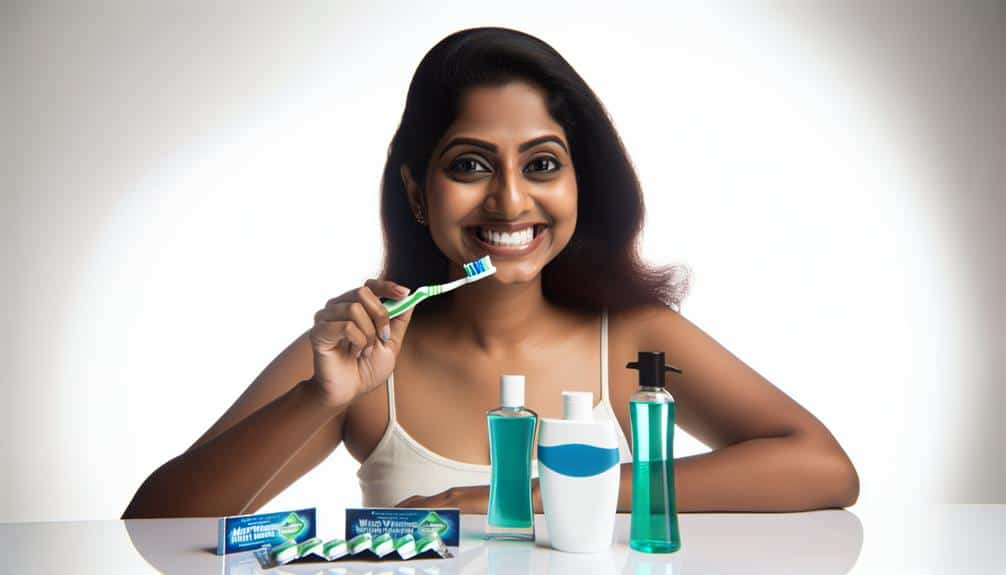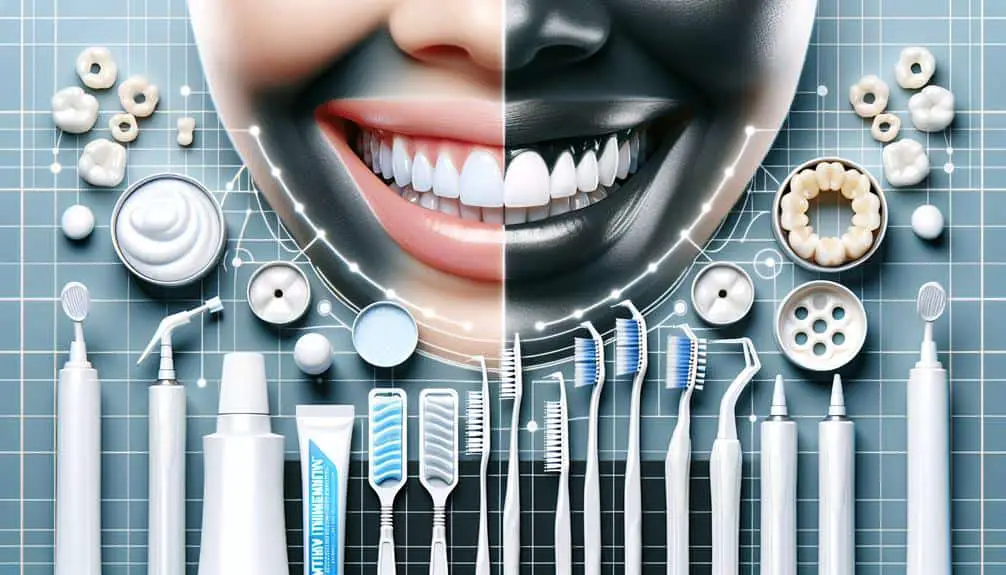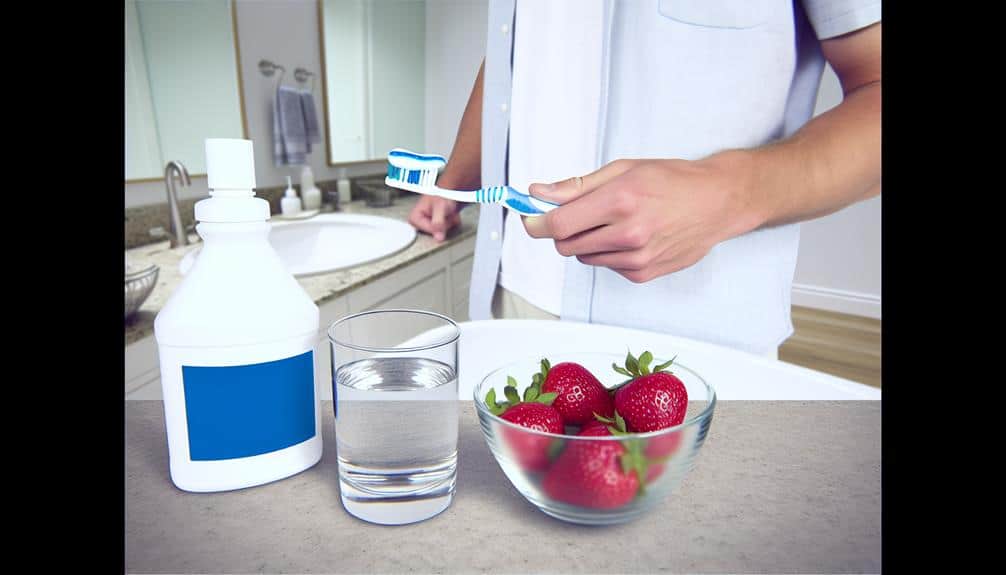To brighten your teeth with spots, try combining lemon juice and baking soda into a whitening paste, as lemon's citric acid aids in whitening. Additionally, consider coconut oil pulling to remove bacteria and whiten teeth with its antimicrobial properties. Hydrogen peroxide rinses can be effective in killing mouth bacteria when used properly. Remember that apple cider vinegar can help whiten teeth, but its high acidity requires dilution to protect enamel. Activated charcoal paste is also helpful in removing stains, but use it sparingly to prevent enamel damage. Safely brighten your smile with these natural methods.
Key Points
- Use lemon juice and baking soda paste for whitening spots gently.
- Coconut oil pulling removes bacteria and whitens teeth effectively.
- Incorporate hydrogen peroxide rinse for antibacterial and whitening benefits.
- Apple cider vinegar solution helps remove stains but dilute to protect enamel.
- Activated charcoal paste absorbs toxins and effectively removes stains.
Lemon Juice and Baking Soda
To enhance teeth using lemon juice and baking soda, combine the two ingredients into a paste and gently brush your teeth with the mixture for a natural whitening effect. Lemon juice is important due to its high citric acid content, which can help in whitening teeth. However, it's vital to take citrus precautions when using lemon juice on your teeth. The acidity in lemon juice can erode tooth enamel if used excessively or for prolonged periods. To mitigate this risk, it's recommended to limit the frequency of using lemon juice for teeth whitening and rinsing the mouth thoroughly after application.
When combined with baking soda, the pH balance of the mixture can help neutralize some of the acidity from the lemon juice. Baking soda is mildly abrasive and can aid in removing surface stains on teeth, contributing to a brighter smile. Remember, maintaining the pH balance in your mouth is essential for overall oral health. It's advisable to consult with a dental professional before using homemade remedies to make sure they're suitable for your specific dental needs.
Coconut Oil Pulling
Using coconut oil for oil pulling is a popular natural method to promote oral health and potentially whiten teeth. Oil pulling involves swishing oil around in your mouth to remove bacteria and promote healthier gums. Coconut oil, known for its antimicrobial properties, can be particularly effective in this practice. Research suggests that coconut oil pulling can reduce plaque formation, improve gum health, and even help in teeth whitening.
This ancient Ayurvedic technique is believed to draw out toxins from the body, including the mouth, through the process of oil swishing. To try coconut oil pulling, take a tablespoon of coconut oil and swish it around in your mouth for about 15-20 minutes. Make sure not to swallow the oil as it will contain bacteria and toxins from your mouth. After swishing, spit out the oil and rinse your mouth with water before brushing your teeth as usual. Incorporating coconut oil pulling into your oral care routine can be a beneficial addition to promote oral health and explore natural remedies for teeth whitening.
Hydrogen Peroxide Rinse
Brighten your smile and enhance your oral hygiene routine by incorporating a hydrogen peroxide rinse, a simple and effective method for promoting dental health and potentially whitening teeth. Hydrogen peroxide is a common household product known for its antibacterial properties and is often used in dentistry for its ability to kill bacteria in the mouth. When used correctly, it can be a safe and affordable way to improve oral health.
However, it's important to be aware of the following:
- Hydrogen Peroxide Safety: Dilute the hydrogen peroxide with water to reduce its concentration and prevent irritation to the gums and mouth.
- Risks of Overuse: Excessive use of hydrogen peroxide can lead to tooth sensitivity and irritation of the oral tissues. It's recommended to use it in moderation and not exceed the recommended usage.
Apple Cider Vinegar Solution
Are you curious about the potential benefits of incorporating an apple cider vinegar solution into your oral care routine? Apple cider vinegar is a popular natural remedy that's believed to have various health benefits, including for oral hygiene and dental care. When it comes to brightening teeth with spots, some people suggest that the acetic acid in apple cider vinegar can help remove stains and whiten teeth.
However, it's important to use caution when considering apple cider vinegar for dental purposes. The high acidity of apple cider vinegar can potentially erode the enamel of your teeth if not used properly. To minimize the risk of enamel damage, it's advisable to dilute the apple cider vinegar with water before using it as a mouthwash. Additionally, it's vital to limit the frequency of use to avoid any negative effects on your dental health.
While some individuals may experience benefits from using apple cider vinegar for dental care, it's recommended to consult with a dentist before incorporating it into your oral hygiene routine to make sure it's safe and suitable for your specific needs.
Activated Charcoal Paste
To enhance the appearance of your teeth and address stains, contemplate integrating activated charcoal paste into your oral care routine. Activated charcoal is recognized for its ability to absorb toxins and stains, making it a favored choice for natural remedies in oral health. Here are some key points to ponder:
- Stain Removal: Activated charcoal paste works by attaching to compounds that cause stains on the teeth, aiding in removing them effectively.
- Balanced pH Levels: This natural remedy can also help balance the pH levels in your mouth, creating an environment less conducive to the growth of bacteria that can lead to tooth discoloration.
- Caution: While activated charcoal can be effective in brightening teeth, it's abrasive and should be used sparingly to prevent damage to the tooth enamel. Consult with your dentist before integrating it into your oral care routine to make certain it's fitting for your individual oral health needs.
Frequently Asked Questions
Can I Combine Multiple Natural Remedies for Brighter Teeth, Such as Using Lemon Juice and Baking Soda With Coconut Oil Pulling?
When brightening teeth, combining lemon juice and baking soda is beneficial for whitening. However, be cautious with baking soda due to its abrasive nature. Consider incorporating coconut oil pulling for additional oral health benefits, but use it correctly.
Are There Any Potential Side Effects or Risks Associated With Using Hydrogen Peroxide for a Teeth Whitening Rinse?
When using hydrogen peroxide for teeth whitening, understand the risks and benefits. Safety is key, so follow precautions like diluting properly and limiting use to avoid potential side effects such as gum irritation or tooth sensitivity.
Can Apple Cider Vinegar Solution Be Used as a Mouthwash for Teeth Whitening on a Daily Basis?
For teeth whitening, daily use of apple cider vinegar rinse is not recommended. Its acidic nature can erode enamel and irritate gums. Consult a dentist for safe options. Protect your oral health.
How Often Should Activated Charcoal Paste Be Used for Best Results in Brightening Teeth?
To achieve best results in brightening teeth with activated charcoal paste, use it no more than once a week. Using it more frequently may wear down enamel and harm gums. Combining remedies can enhance effectiveness, but prioritize safety.
Are There Any Specific Dietary or Lifestyle Changes That Can Enhance the Effects of These Natural Teeth Whitening Methods?
To enhance natural teeth whitening methods, consider dietary changes like consuming more crunchy fruits and veggies for scrubbing action. Lifestyle adjustments include reducing staining beverages like coffee and tea. Small changes can lead to noticeable improvements in teeth brightness.



